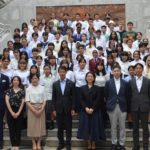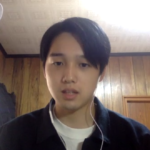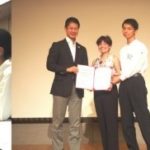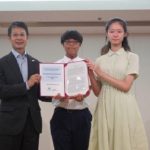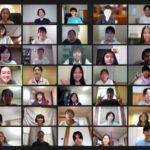Hiroshima Junior International Forum Participant Interview
Hiroshima Prefecture held the seventh edition of the “Hiroshima Junior International Forum,” a project designed with the intent to develop and nurture the next generation of people who stand and live for peace, as an online program. Today, we spoke to Sakata Yuta, a second-year student at Sotoku High School and member of its newspaper club, about the opportunity that triggered his participation in this forum, and what he gained as a result.
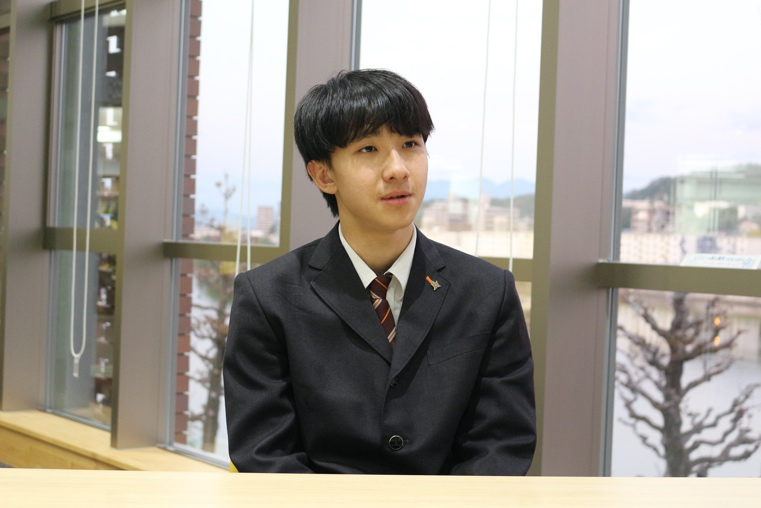
・What was the opportunity that triggered your participation?
My teacher, who is an advisor to our newspaper club, recommended that I participate. The newspaper club of Sotoku High School covers not only the things that happen at our school, but also a wide range of topics such as peace and international issues. I had an opportunity as well to interview atomic bombing victims, and as I accumulated experiences such as that, I began to gain an interest in peace, and I started to feel that the people of our generation need to become active with regard to achieving peace. Also, I’ve had an interest in international issues and the environment since I was in junior high school, and I’ve loved English classes. So, because of such things, I applied immediately.
・What made an impression on you?
The program consisted of two parts. A lecture regarding the total destruction of nuclear weapons, and peace-building efforts, and a group discussion for crafting the “Hiroshima Declaration.” The thing that surprised me upon listening to the lecture was not about the major problem of nuclear weapons, but that there were smaller weapons which utilized nuclear technology which were already in circulation, and hearing about the existence of terrorist organizations which plot to get their hands on such weapons. I had of course known about the dangers of various countries possessing nuclear weapons, but I felt frightened to learn about the fact that non-governmental organizations were trying to get a hold of nukes as well.
For the group discussion, there were approximately 60 participants, so we broke up into smaller groups, and talked about what the younger generation could do, and what Hiroshima’s role could be. There were a total of six persons in my group. There was a person from China, and even a person from the Middle East. Since I was the group leader, I moderated the discussion, and organized and consolidated everyone’s opinions. But since I had to do it in English, and because it was an online session, it was so difficult! It was a topic that would have been difficult enough to conduct in Japanese, but to discuss it in English … I acutely felt how deficient my skills were, but still, I felt that it turned out to be a significant and worthwhile experience.
・What did you gain from this experience?
I believe I have gained an increased sense of ambition and enthusiasm as a person. I’ve become able to proactively communicate with people who speak a different language, and I now have a deeper understanding about peace. By having detailed knowledge about the current global situation, I think the sense of impending crisis toward the nuclear threat has attained an even more sober feeling of reality.
Also, I reported on the events of the forum in our school newspaper. At this newspaper club, if there is something we want to communicate, we can write our own articles and publish them, so I feel that it was great to be able to transmit this experience I went through from the perspective of a high school student. It was also wonderful to be able to interview the other high schoolers who participated in the forum as part of my reporting for the newspaper, and engage them in deep conversations.
Afterward, my teachers told me that they were proud of my involvement in this series of events. They praised me for conducting the discussions in English, and for organizing those events as a newspaper article, and that gave me a lot of confidence.
• What kinds of efforts would you like to be involved with in the future?
I was thinking that I would like to learn more about peace in college, and so I’ve already decided upon a university that I would like to attend immediately. But peace is a big topic, covering everything from denuclearization to education, and a lot of other elements. So at university, I would like to go to classes of an even higher order, and learn together with like-minded colleagues with lofty ambitions and aspirations.
Eventually, I would like to create a place where high school students, like myself, can participate more in activities for peace. An older student and former member of the newspaper club who had already graduated to college was often talking about the term, “high school brand.” I believe that the fact that we’re in high school actually provides us with a lot of chances to have our voices heard, and that none of us realize that yet. Right now, peace activism can feel like a peculiar, unique thing, but I hope that it can become something normal, natural, like a mathematics class. I hope that in the future, I can become someone who can provide a place that will inspire people of a younger generation to trigger their own activism.
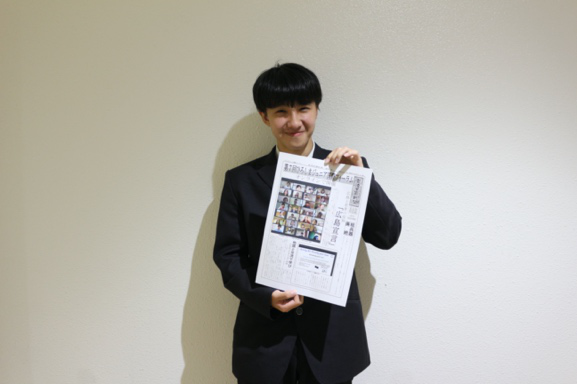
Sakata Yuta:
A second-year student at Sotoku High School. In the newspaper club, he serves as group leader for a group in charge of international understanding. He also possesses a rather unusual side—his cultural tastes tend to be rather idiosyncratic and cool, due to his father’s influence, as he greatly admires Shimura Ken (a famous Japanese comedian) and Atsumi Kiyoshi (a legendary actor).
Tags associated with this article



